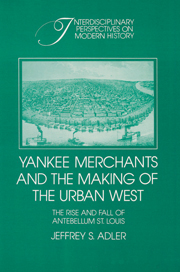Book contents
Conclusion
Published online by Cambridge University Press: 14 September 2009
Summary
Sectionalism remade the urban West. The debate over the future of slavery triggered the fall of St. Louis, the first major commercial center of the trans-Mississippi West. It transformed the principal western cog in the national economy into a declining, inward-looking city served by a shrinking hinterland. Moreover, the sectional crisis spurred the development of Chicago. When Yankee merchants abandoned St. Louis and began to direct their attention to Chicago, the Illinois city mushroomed. Towns and cities within Chicago's hinterland enjoyed new prosperity as well. Thus, Chicago supplanted St. Louis during the late 1850s, becoming the major eastern outlet in the West and the greatest boomtown in the nation.
Yankee merchants forged the growth of western cities in antebellum America. Although geography and natural “zodiacs” influenced urban development, human factors elevated Chicago to greatness, trapped Cairo in its infancy, and triggered the dramatic rise and the relative fall of St. Louis. Young western cities lacked institutions, capital markets, and commercial networks. Migrants supplied these needs, and the city that captured eastern favor flourished and dominated its rivals. Yankee newcomers, bringing venture capital, economic power, and eastern cultural conventions, affected the urban West by choosing to migrate to one city over the next.
- Type
- Chapter
- Information
- Yankee Merchants and the Making of the Urban WestThe Rise and Fall of Antebellum St Louis, pp. 175 - 177Publisher: Cambridge University PressPrint publication year: 1991



